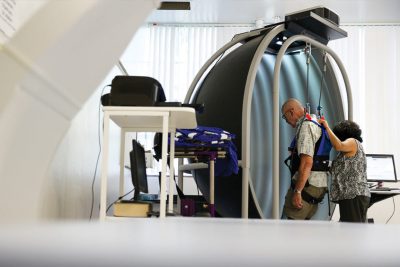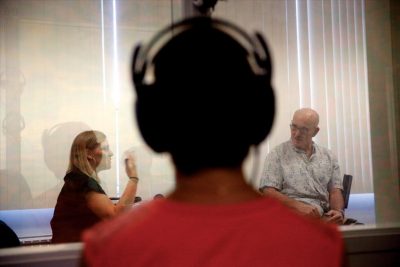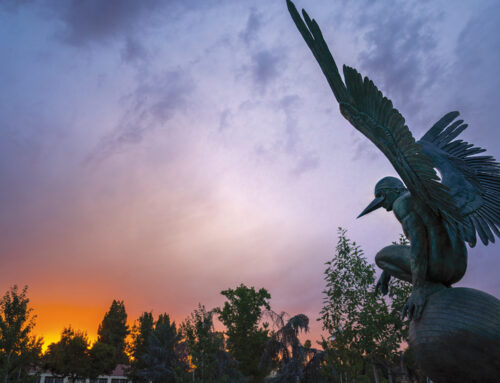A Community Need
University exercise program provides free services for Parkinson’s patients
By Melissa Tav
 For 30 years, Mel Stratton made a living by relying on the precise, timely motion of his hands and arms as he directed high school bands locally and across the nation. Though a Parkinson’s diagnosis in 2000 threatened his ability, he didn’t let it deter his passion of creating visual and melodic works. In fact, the sounds of the electric beats inspired him to march on.
For 30 years, Mel Stratton made a living by relying on the precise, timely motion of his hands and arms as he directed high school bands locally and across the nation. Though a Parkinson’s diagnosis in 2000 threatened his ability, he didn’t let it deter his passion of creating visual and melodic works. In fact, the sounds of the electric beats inspired him to march on.
Stratton was initially diagnosed with arthritis in 1999 at age 52, but something in his gut told him to examine his health further. Something more was causing his strength and hand-eye coordination to deteriorate. It was Parkinson’s disease, a central nervous system disorder that affects movement and often includes involuntary tremors.
Stratton now spends his Mondays and Wednesdays at Fresno State, where the Department of Physical Therapy has offered a unique, free exercise program for individuals with Parkinson’s since 2015.
In the Central Valley, a region known to have one of the highest rates of Parkinson’s in the nation, having a free, accessible exercise program was necessary, said Dr. Monica Rivera, an assistant physical therapy professor at Fresno State and director of the exercise program.
“What we know is that therapy or physical activities are strongly advocated by neurologists,” Rivera says. “Parkinson’s is a degenerative disease, but through an intervention exercise program we can improve aspects of motor control and function by participating in a six- to eight-week program. What we are trying to discover is, can we carry that on for a longer period of time if they keep exercising?”
For 45 minutes at a time, Stratton and other community members participate in exercises that strengthen their cores, stimulate their motor systems and heighten their balance — all of which are meant to improve their physical function and quality of life. Physical therapy faculty and students facilitate the program.
During class, those like Danielle Roche, a third-year doctor of physical therapy student, set up an obstacle course of boxes and cones and have Stratton strategically maneuver over and around each one.
The goal of the agility- and gait-training exercise is to have Stratton practice changing motor plans, a common and difficult feat for most with Parkinson’s. For Roche, who plans to specialize in neurology after she graduates, Stratton’s improvement has been inspiring.
“One day after a session he was able to walk with excellent posture and gait, which was significant because he would normally have to use his scooter to get to each of our treatment rooms due to his freezing episodes,” Roche says.
The initial idea for the Parkinson’s exercise program was spearheaded by 2015 doctor of physical therapy alumnus Dr. Audrey Tan, who now runs the program’s popular yoga component one day a week.
Cognitive Services
 Hoping to further increase services, the Department of Communicative Sciences and Deaf Studies at Fresno State launched its Parkinson’s Research Clinic to provide clients an opportunity to work on cognitive communication functions, as well.
Hoping to further increase services, the Department of Communicative Sciences and Deaf Studies at Fresno State launched its Parkinson’s Research Clinic to provide clients an opportunity to work on cognitive communication functions, as well.
After his exercise program, Stratton walks to another area of campus where graduate speech-language pathology students greet him.
For the next hour, he receives individual speech therapy, working to achieve better communication, voice projection and speech intelligibility.
After eight weeks, clients move on to the second phase of the program, group therapy. Graduate students, who receive clinical hours, facilitate all sessions.
“For students, this experience will prepare them to work with this population upon graduation, which further increases the treatment opportunities for local clients with Parkinson’s,” said Sabrina Nii, director of the Parkinson’s Research Clinic.
Individuals with Parkinson’s are just one of the many populations the College of Health and Human Services assists. It also offers an Aphasia Group Clinic for individuals who have experienced a stroke and now have communication issues.
The Senior Awareness Fall Education Central Valley Coalition holds its Fall Balance Screenings, which bring together physical therapy, kinesiology and nursing students to collaborate with pharmacy students from California Health Sciences University in providing free balance and gait tests for older adults.
This practice of interprofessional education allows clients the best possible care, while giving students real-world experience.
“It’s the best outcome for the patients for their health-care providers to always be connected,” Rivera says.
For Stratton, the opportunity to receive free services through Fresno State has been invaluable toward slowing the progression of his Parkinson’s. He credits the creativity of students and faculty for his improvement and for giving him the confidence to continue to step to the beat.
— Melissa Tav is a communications specialist for the College of Health and Human Services at Fresno State.
For more information on these services call 559.278.2422.






